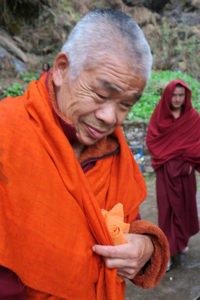– Joaquim Magalhães de Castro
In his Relation Estevão Cacela does not forget to emphasize the high intellectual capacity of the sovereign, “a man of great knowledge,” who was surrounded by the best monks: religious men from the region and from the neighboring kingdoms, such as that of Chaparangue and also the one of Ladak, that was always its ally in the battles against the king of Utsang, Central Tibet. Being an enlightened monarch, his interest in keeping foreigners in the kingdom is not surprising. He soon realized that they were people of great wisdom.
In his itinerancy Shabdrung was accompanied “by a group of lamas that he always brings along with him, which are more than a hundred with a remarkable exercise of learning to do his ceremonies.” Among the monks there was a special caste – the “guelões,” i.e, the Gelupa sect – that always accompanied him. They did not marry and feast sparingly and could not eat after noon. They were barred from eating rice, meat, fish and “never drink wine.” In this they distinguished themselves from the other religious whose rules were much less rigid. Cacela tells us that the “guelões” kept in recollection in the monastery, where they ate and slept, leaving only twice a day, in the morning and in the afternoon. Our Jesuit laments that they were always “busy with the errors taught to them.” He also describes these lamas as people who do not carry weapons and shave their heads, although some, a few, would eventually grow a beard. And, religious man that he was, he certainly was not surprised at the disciplined life they led, spending part of the day with prayers. This task began at dawn: “At night they all rise to a sign that they give them and pray like for half an hour and again at dawn, singing as clergymen in chorus,” a habit as it happens, after all, among the Catholic friars, with vespers.
Even today, the “guelões” inhabit Chagri, although the rules to which they are subject are not so rigid. On a plaque at the entrance to the “Chapel of the Demon Enslaved” is the following warning: “We respectfully request the foreigners without the proper letter of authorization and the Bhutanese without their traditional costume to not enter this chapel.”


 Follow
Follow


